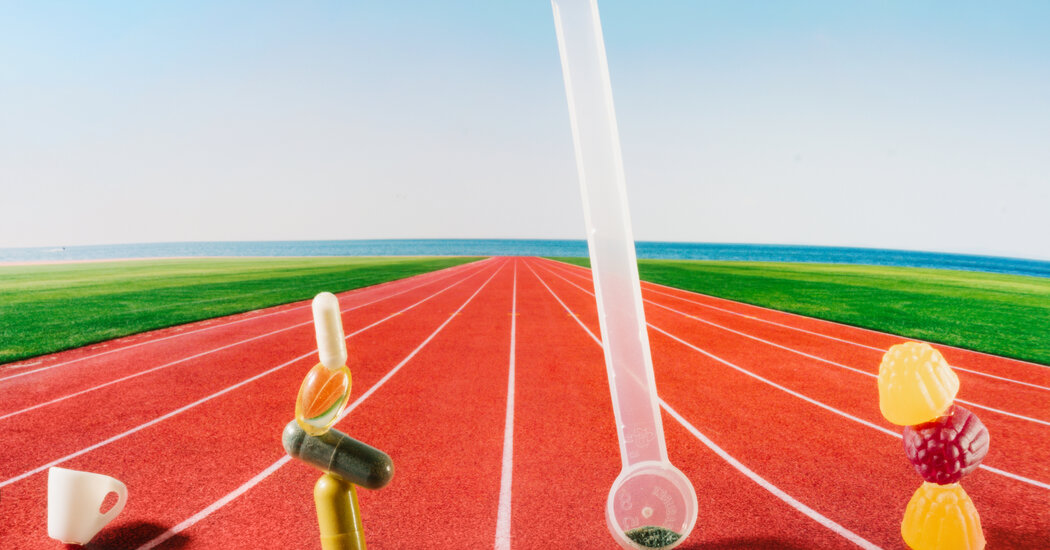Exercise is hard. Swallowing a pill is easy. This might be the simplest explanation for why American consumers spend billions of dollars each year on sports supplements that promise to make them faster or stronger.
But of the tens of thousands of supplements on the market, few have actually been proven to improve your health or performance. Worse, research has shown that many products marketed as workout boosters contain dangerous unlabeled additives like experimental stimulants, steroids or sky-high doses of caffeine.
So what can really give you an edge in your workout? The International Olympic Committee tackled the question a few years ago. The very short list of supplements below are those endorsed by its Medical and Scientific Commission as “a legitimate part of an athlete’s preparation,” supporting health and optimizing performance. The list is a rare point of agreement among supplement researchers: The skeptics and boosters among them generally agree that these are the ones with the best evidence behind them.
Still, none of them will make you a super-athlete. “There’s not going to be one pill that helps you with pickleball and weight lifting and running a marathon,” said Pieter Cohen, a physician and researcher at Harvard Medical School who studies supplements. Instead, each of the supplements below offers a slight boost in specific contexts when used as directed.
The big five sports supplements
Caffeine: Caffeine helps billions of people wake up in the morning, but it’s also a widely used sports supplement. It works by altering how your brain perceives effort, enabling you to push harder for longer. Its benefits are most well-established for endurance events, but it’s also useful for short sprints and team sports.
You can get this effect from a cup of coffee, but if you want to dial in the effect with greater precision, scientists typically recommend three to six milligrams per kilogram of body weight about an hour before exercise, which is 200 to 400 milligrams if you weigh 150 pounds. That’s roughly one to two cups of coffee, but the caffeine content of coffee can vary widely. And be warned: People metabolize caffeine at different rates, so the ideal timing and dose will vary.
Creatine: The most widely used and effective supplement for building muscle is creatine, which is derived from amino acids. It works by topping up your stores of phosphocreatine, which helps fuel short bursts of maximal effort lasting a few seconds at a time. This, in turn, might enable you to squeeze out an extra rep or two in the gym.
But creatine won’t make you stronger instantly: Its benefits accrue over months, with a typical daily dose of three to five grams, because you’re able to push a little harder in each workout. Researchers have recently begun to study whether creatine might also have other benefits for brain health, heart disease and more — but for now, the strongest evidence is for muscles.
Baking soda: As you might remember from building baking soda-and-vinegar volcanoes in grade school, sodium bicarbonate is a base that can neutralize acids. And while the idea that lactic acid causes muscle fatigue is outdated, it’s true that sustained hard efforts make your muscles and bloodstream increasingly acidic, which interferes with muscle contraction. Ingesting baking soda counteracts this effect.
Baking soda’s performance-boosting properties have been known for decades, but its side effects — nausea and other unpleasant gastrointestinal symptoms — have limited its popularity. Two years ago, the Swedish company Maurten introduced a product that suspends the baking soda in a gel that makes it easier to digest. The result: “bicarb” is now widely used by top endurance athletes.
Beta-alanine: Just as baking soda counteracts rising acidity in the bloodstream, beta-alanine is a naturally occurring amino acid that acts as a buffer within muscle fibers, boosting performance during bursts of intense exercise that last for a few minutes. Unlike baking soda, which works quickly, beta-alanine requires daily supplementation for 10 to 12 weeks to show an effect.
Nitrate: A series of studies starting in the late 2000s showed that consuming nitrate lets you burn slightly less energy while running at a given pace, for reasons that still aren’t fully understood. This efficiency boost is particularly valuable in longer endurance events, such as half-marathons and marathons.
The most common form of nitrate supplement is beet juice, which is available as concentrated beet shots that are easier to down and contain a standardized nitrate dose of 400 milligrams. They can be hard on the stomach, so try them in training before breaking them out for a race.
Does anything else work?
The I.O.C.’s supplement list was published in 2018. In the years since, other supplement fads have come and gone among athletes: ketones as an extra energy source; collagen to build springier tendons and ligaments; antioxidant cocktails to accelerate recovery.
Each of these claims is supported by at least some well-designed, peer-reviewed studies. But that doesn’t guarantee they really work. After all, a recent attempt to reproduce the results of 25 major studies in sports and exercise science was successful in just seven cases. What distinguishes the supplements on the I.O.C. list is the accumulation of dozens of studies all pointing in the same direction.
Still, the I.O.C. list isn’t set in stone. “My take is that there’s always something looming and there could be a new beetroot juice somewhere,” said Louise Burke, a sports nutrition researcher at Australian Catholic University in Melbourne and one of the authors of the 2018 I.O.C. statement.
For example, protein powder is worthy of consideration, according to Jose Antonio, a professor at Nova Southeastern University in Florida and co-founder of the generally pro-supplement International Society of Sports Nutrition. The line between what counts as a supplement and what counts as food can be blurry, Dr. Antonio said, but in its powdered form protein is taken like a supplement, and there’s compelling evidence that it can contribute to muscle gains from strength training.
A quick glance at the internet will yield a long list of other potential sports supplements, many endorsed by prominent athletes and influencers and purportedly backed by research. It’s tempting to think that one of these pills might unlock your hidden potential. But in most cases, Dr. Burke said, “the mystique probably makes it better than the actual science.”
Alex Hutchinson is a columnist at Outside and the author of “The Explorer’s Gene: Why We Seek Big Challenges, New Flavors, and the Blank Spots on the Map.”
The post 5 Workout Supplements Worth Trying appeared first on New York Times.




